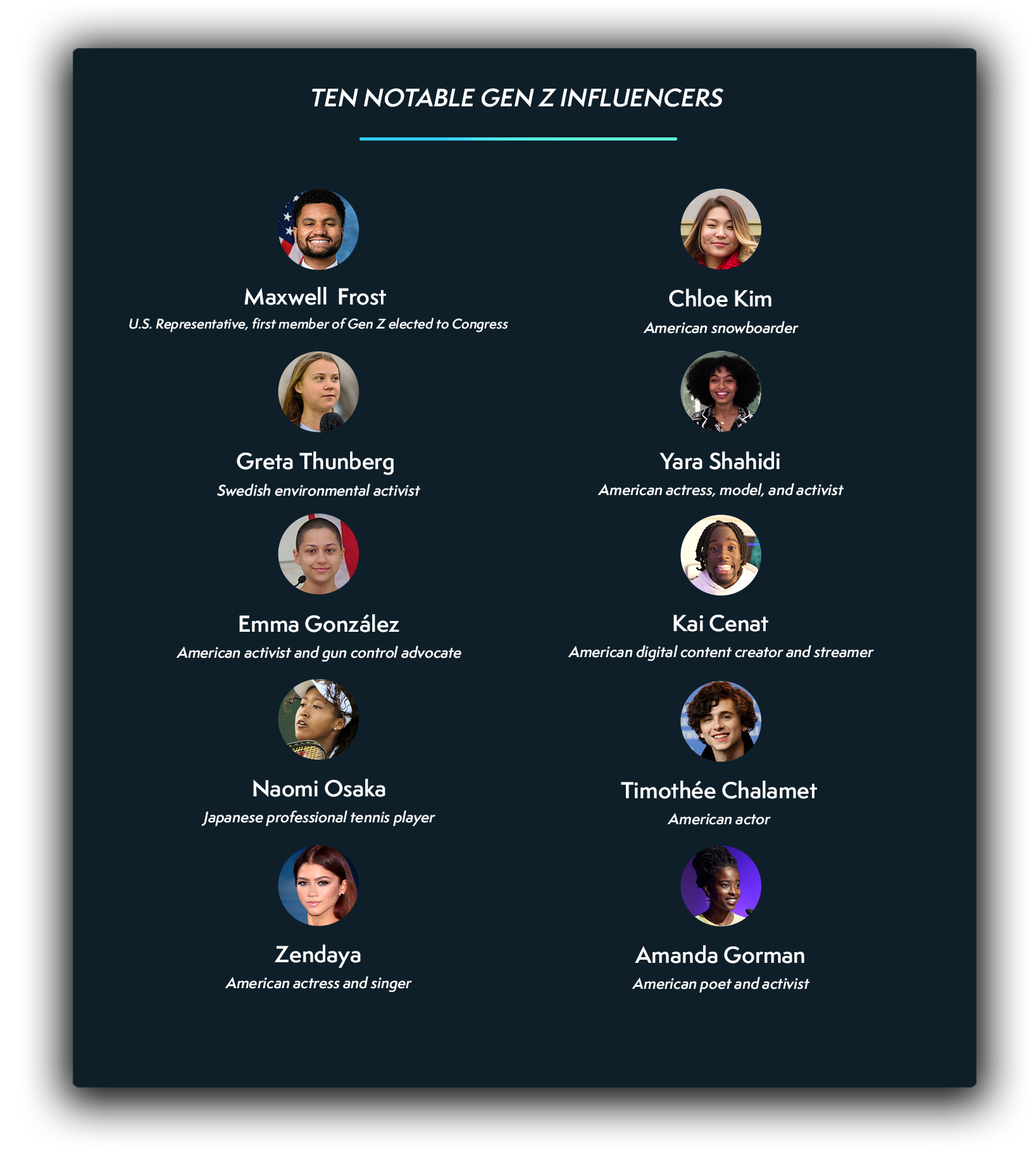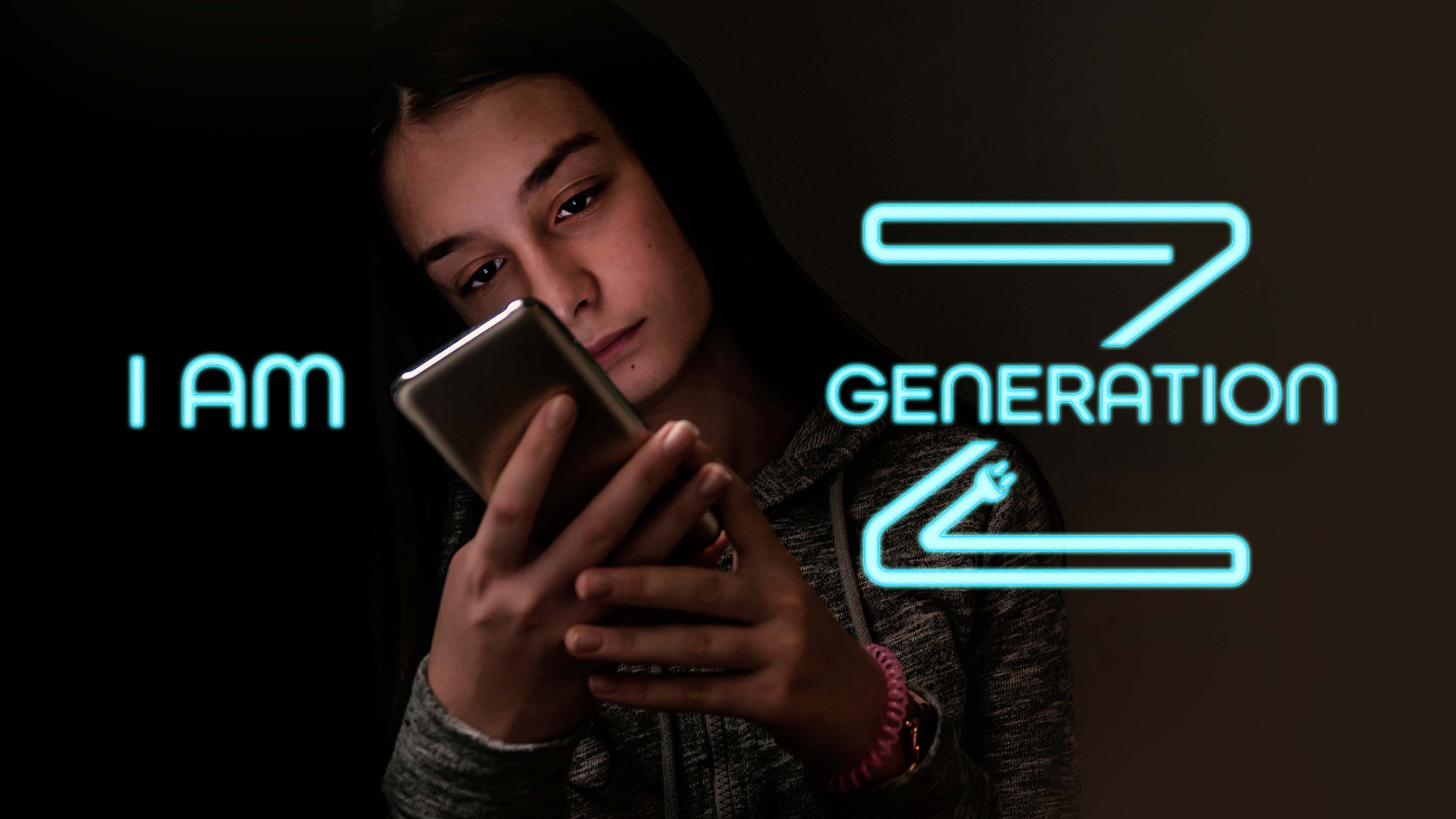What’s up with Gen Z? Straddling real life and the digital world is stressing this new generation. How can they thrive in our new environment – and what can we learn from them?
◊
Are you Gen Z? I’m not, as I was not born between the mid-1990s and the early 201 0s. But if you are, or if, like me, you’re interested, you may find the cultural drama of Generation Z fascinating: This generation, born into a fully mediated world with the wide availability of handheld digital devices, would seem to be a blessed generation, with powerful computing skills at their fingertips and the ability to communicate with peers and others all around the world, and in real-time.
But all is not well with Gen Z’s young men and women. The Annie E. Casey Foundation reports several issues affecting this generation’s psychological well-being. Social anomie, lack of authentic communication, and constant comparison with online “influencers” are among them. Influencers promote unattainable standards of beauty, excitement, and well-being and, as a result, more young people are experiencing trauma and other mental health issues.
Anxiety and depression, mainly caused by online experiences, are at an all-time high. And what is to be done? Has technology gotten ahead of human adaptation? Let’s take an outsider’s look at the dramatic highs and lows of Gen Z’s existence and experience of life and culture.
What's Gen Z up to? Watch MagellanTV's I Am Generation Z to find out.
Born into Gen Z, for Better and Worse
As my colleague Sari Wagner explores in her article concerning Gen Z, technological advances, cultural shifts, and a slew of unsettling global events have shaped this group of young people. These differences have impacted various aspects of life, including privacy, individualism, social interactions, and self-confidence.
Here are some of the key issues shaping the outlook of Gen Z:
1. Digital natives vs. digital immigrants: Gen Z has grown up in a fully digital world, with smartphones, social media, and the Internet as integral parts of their daily lives from a young age. They are considered “digital natives.” On the other hand, older folks experienced the introduction of these technologies and are considered “digital immigrants.” This has influenced how different generations interact with technology, information, and each other.
2. Privacy: With the rise of social media and digital footprints, Gen Z faces unique challenges regarding privacy. They navigate a world where personal information is often publicly shared and permanently available online. Previous generations grew up with more traditional notions of privacy, where personal information was shared among smaller, more intimate groups and was less permanent.
3. Education and skills: The education system has evolved to incorporate digital literacy for Gen Z, emphasizing the importance of navigating and critically evaluating information online. There’s a greater emphasis on collaboration across digital platforms and preparing students for a rapidly changing technological landscape. At the same time, some elements of writing and reasoning, or critical thinking, have been de-emphasized.
4. Communication: Gen Z most often prefers digital forms of communication, such as texting, messaging apps, and social media, over face-to-face interactions. This has implications for social skills, with some concerns about the impact on empathy, deep relationships, and communication nuances. Some of this may seem alien to older people who grew up relying on in-person interactions and real-time phone calls.
5. Individualism vs. collectivity: While adults in past generations can be characterized by a strong sense of individualism and personal achievement, Gen Z is noted for its focus on social justice, inclusivity, and collective action. It is more likely to be engaged in social and environmental causes, utilizing digital platforms to mobilize and express their views.
6. Self-confidence and mental health: There is growing concern about the impact of social media and digital life on Gen Z. Constant comparison, cyberbullying, and the pressures of an always-connected world can have negative effects. Earlier generations, while facing their own societal pressures, did not grow up with constant digital comparisons and feedback loops.
(Source: Adobe Stock Images)
Welcome to the Digital Age – Don’t Bother, It’s Here
The advent of the digital age, particularly the rise of social media, has had a profound impact on the self-confidence and mental health of Gen Z. These issues do not impact all individuals equally; there are nuances in how males and females experience and respond to these stressors.
Constant Comparison
What’s known as “social comparison theory” suggests that individuals nowadays determine their own self-worth based on how they stack up against others. With social media, these comparisons are amplified and constant. Users are bombarded with images and narratives that often present an idealized version of life, achievements, and physical appearances. This can lead to feelings of inadequacy, low self-esteem, and a distorted sense of reality. For Gen Z, growing up with these constant, ongoing comparisons can undermine self-confidence, contributing to anxiety and depression.
- Effects on males and females: Research suggests that while both genders are affected by social comparison, girls are more susceptible to body comparisons. The National Institutes of Health reported in 2023 that, “social media usage leads to body image concerns . . . via the mediating pathways of social comparison.” Boys, on the other hand, might experience pressure related to financial success, muscular development, or other stereotypes.
Cyberbullying
Cyberbullying involves harassment, humiliation, or bullying conducted via digital means, such as social media, messaging apps, and online platforms. It can be particularly damaging because it is pervasive, can be anonymous, and can follow victims into what would traditionally be safe, private spaces like their homes.
- Psychological effects: Victims of cyberbullying are at a higher risk of depression, anxiety, and even suicidal ideation. The relentless nature of online harassment can lead to feelings of isolation, helplessness, and worthlessness. The public aspect of cyberbullying can also amplify its impact, as humiliating content can be shared widely and quickly.
Pressures of the Virtual World
The pressures of maintaining a presence on social media, managing perceptions, and engaging in digital interactions can be overwhelming. This includes the pressure to always be available, to present the image of a perfect life, and to accumulate likes, followers, and positive comments.
- The price of attention: Many Gen Zers (and Millennials, to be fair) have turned social media success, or “virality,” into full- or part-time careers as influencers. This new earning class faces the dilemma of monetizing its online presence and dealing with its negative impacts. Earnings come at the cost of stress and anxiety from the pressure to uphold an image, produce content continuously, and interact directly and frequently with followers. This relentless pursuit of online validation can spur anxiety and loneliness due to fear of missing out (FOMO) and blur the distinction between public and private selves, leading to a loss of authenticity and existential dilemmas.
The negative effects of the virtual world on self-confidence and mental health are significant. The digital era, while offering unprecedented opportunities for connection and learning, also presents new challenges, necessitating critical strategies for resilience, digital literacy, and support systems tailored to the needs of Gen Z.

How to Thrive? Get Tech-Literate
Digital literacy is a new but necessary skill set that enables individuals to engage effectively with technology in a thoughtful, analytical, and responsible manner. This specialized literacy involves understanding the varieties of digital content, including its creation, context, and impact. It is particularly important for Gen Z members, who are immersed in digital environments from a young age.
Digital literacy includes:
1. Critical thinking and evaluation: The ability to assess the credibility, reliability, and bias of digital information comprises distinguishing between credible sources and misinformation, understanding the intentions behind digital content, and recognizing perspectives and biases.
2. Digital safety and privacy: Understanding how to protect one’s privacy online and navigate digital spaces safely includes knowledge of data privacy issues, understanding how personal information may be collected and used online, and strategies for safeguarding personal information and digital identities.
3. Media literacy: The ability to decode media messages, understand the economic and cultural contexts in which media is produced and consumed, and recognize the ways in which media can influence perceptions and behavior is essential.
4. Ethical consideration: Understanding the ethical implications of digital actions and interactions means considering the impact of one’s digital activities on others, engaging in respectful and constructive online communication, and navigating moral and ethical dilemmas in digital contexts.

(Source: Adobe Stock Images)
How to achieve these goals is key but often overlooked. Media literacy includes a variety of aspects, including navigating information overload, becoming an aware and ethical digital citizen, and confronting those elements of the virtual world that are prone to cause anxiety and other mental health issues.
Developing a critical digital literacy in Gen Z is essential for empowering today’s young people to become informed, responsible, and resilient participants in the digital world, equipped to face the challenges and opportunities of the 21st century.
What Can We Learn from Gen Z?
To be certain, Gen Z is decidedly not a “silent generation.” Their mastery of digital communication means we all can “tune in” as their images and voices spread online, from YouTube and Instagram to TikTok, Snapchat, and Twitch. And what are they saying? I looked into a small number of cultural and media “influencers,” who may or may not be representative of their entire generation. Each voice, however, is authentic, a term much coveted among today’s tastemakers.
Trans influencer Jazz Jennings, now 23, who virtually grew up onscreen, as did many Gen Z influencers, hopes that the future is more accepting of and comfortable for trans people. And, with her YouTube channel and many media appearances, she’s doing what she can to influence opinion. In a Nylon magazine article about notable Gen Zers, she told an interviewer she hopes other generations will “speak their minds and be their authentic selves. . . . You have to stand proud in your truth.”
Pop star Billie Eilish, 22, has played with her visual and sonic self-presentation since she first appeared on the scene in 2019. In an article about her posted on the Medium website, the author says, “it’s time to recognize that maybe what targeted messaging means for this demographic [Gen Z] is brand authenticity . . . this means real, empathetic storytelling.” Eilish’s soft-spoken delivery of her often self-effacing lyrics (“Thought I could fly, so I stepped off the Golden,” goes one) seems to speak directly to the sometimes fragile psyches of Gen Z. “I love bugging people out,” she told one interviewer. “Freaking people out. I like being looked at,” she declared in the perfect Gen Z combination of obscurity and oversharing.
Gun control activist and mass-shooting survivor David Hogg, 23, is co-founder and president of the activist PAC Leaders We Deserve, which supports and develops young political neophytes in their quest to serve in elected office. Hogg says his group is actively seeking “candidates that represent our generation, not just demographically, but also ideologically. . . We need to ensure that we stop school shootings and protect kids and . . . protect our planet.”
While we non-Gen Zers might look at the contemporary world with a mixture of shock and dismay, members of Gen Z are using their online facility to speak out and connect their disparate members, as well as Millennials, Gen Xers, and even the geezers in the room, the Baby Boomers. Despite the trauma many in Gen Z have experienced, they are probably our best hope for turning pessimistic stagnation into hopeful and effective action.
Ω
Kevin J. Martin is Senior Writer and Associate Editor for MagellanTV. Having long been a journalist and communications specialist, he writes on various topics, including Art and Culture, Current History, and Space and Astronomy. He is the co-editor of My Body Is Paper: Stories and Poems by Gil Cuadros (forthcoming from City Lights). He resides in Glendale, California.
Photo credits for Gen Z infographic:
Maxwell Frost, credit: U.S. House of Representatives, via Wikimedia Commons; Greta Thunberg, photo by Stefan Müller, via Wikimedia Commons; Emma Gonzalez, credit: U.S. Army Band, via Wikimedia Commons; Naomi Osaka, photo by si.robi, via Wikimedia Commons; Zendaya, photo by Glenn Francis, via Wikimedia Commons; Chloe Kim, credit: U.S. State Department, via Wikimedia Commons; Yara Shahidi, credit: Condé Nast (through Vogue Taiwan), licensed under the Creative Commons Attribution 3.0 Unported license, via Wikimedia Commons; Kai Cenat, credit: Agent 00 Gaming, via Wikimedia Commons; Timothée Chalamet, photo by Maximilian Bühn, via Wikimedia Commons; Amanda Gorman, photo by Shawn Miller, U.S. Library of Congress, via Wikimedia Commons.
Title Image Source: Adobe Stock Images
Editor's Note: This article has been lightly edited to eliminate repetitive language.



